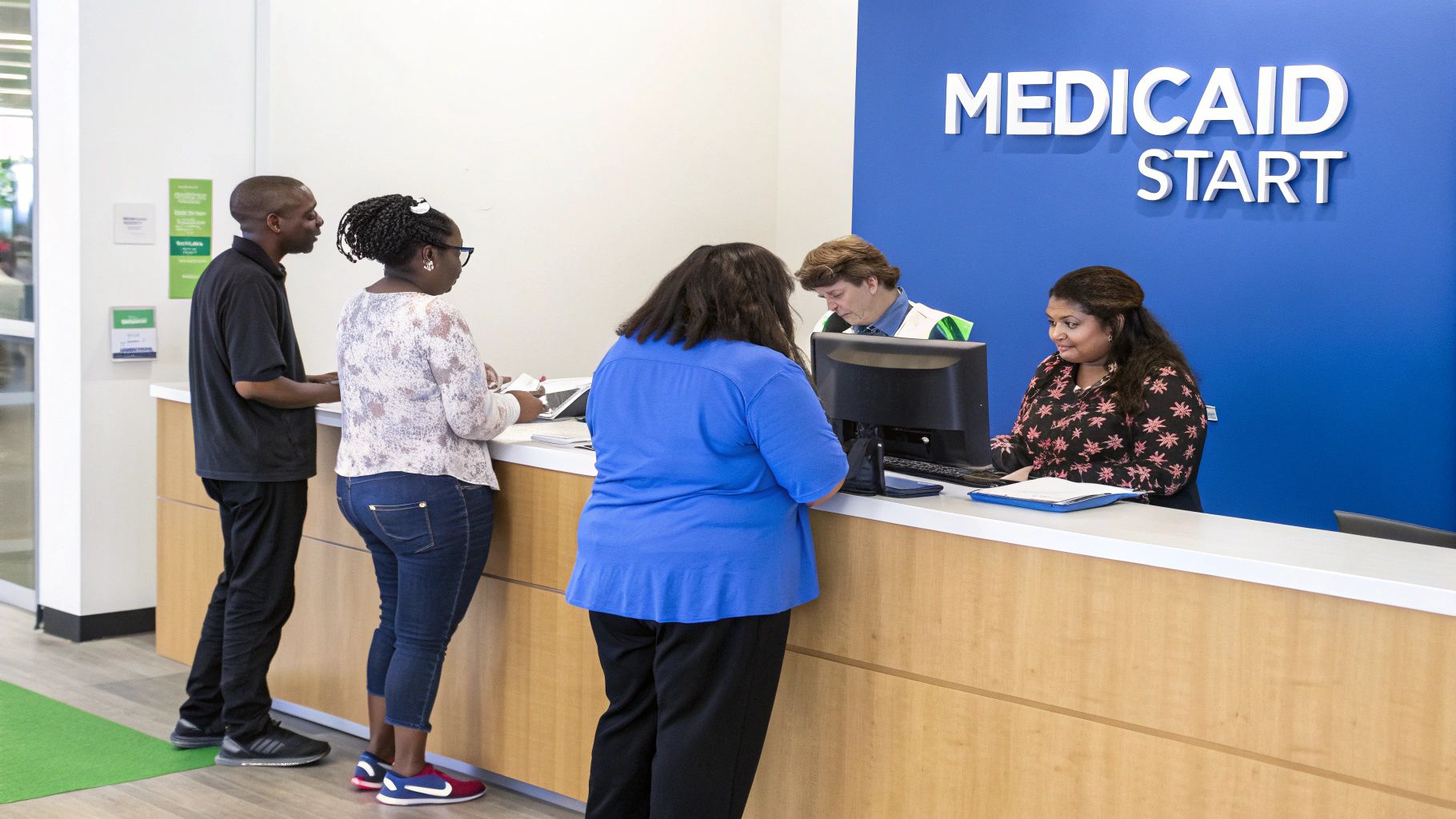Navigating The Medicaid Maze: Why Application Help Matters

Applying for Medicaid can feel like a daunting task. Many applicants, even those who feel prepared, often struggle with the process. This is due to the complex nature of the program itself. Understanding these complexities is key to a smoother application.
Understanding The Complexities of Medicaid
Medicaid isn't a single program. It's a joint federal and state initiative. This means each state operates under its own specific rules and regulations. This creates a challenge for applicants, since eligibility criteria can vary significantly between states.
Income limits, disability definitions, and required documentation are just a few examples of the variations. This can make it difficult to even know if you qualify, let alone complete the application correctly. Navigating health insurance can be confusing. For more information on choosing health insurance, check out this helpful resource: selecting health insurance.
Medicaid application help services are crucial because of the program's broad reach and inherent complexity. In 2022, over 90 million people were enrolled in Medicaid across the United States. Find more detailed statistics here This highlights the widespread need for application assistance.
Common Documentation Challenges
Gathering the required documentation is one of the biggest obstacles applicants encounter. Each state mandates specific documents to confirm eligibility. These typically include proof of income, residency, and household size.
However, many people lack access to these documents or are unsure which ones are required. This can cause delays, application denials, and frustration. Missing documentation is a common roadblock in the Medicaid application process.
The Benefits of Professional Guidance
This is where Medicaid application help becomes essential. Trained professionals can assist applicants through each step. They can help determine eligibility, gather the correct documents, and ensure a complete application submission.
Professional assistance not only increases the chance of approval but also minimizes the administrative burden. This translates to less paperwork, fewer calls to overwhelmed helplines, and quicker access to healthcare coverage. This support is especially helpful for vulnerable populations like seniors, individuals with disabilities, and those with limited English proficiency. By simplifying the process, application help empowers individuals to access the healthcare they need.
Do You Qualify? Demystifying Medicaid Eligibility

Navigating the complexities of Medicaid eligibility can be daunting. Many individuals who might qualify for this essential healthcare coverage hesitate to apply due to confusion surrounding the requirements. This section aims to clarify who qualifies for Medicaid, breaking down income limits and other key factors.
Income Thresholds: A State-by-State Breakdown
Medicaid eligibility is primarily determined by income, but the specific limits depend on your state and family size. Expansion states, which adopted the Affordable Care Act's expansion, typically have higher income limits than non-expansion states.
For instance, a family of three in an expansion state might qualify with an income up to 138% of the Federal Poverty Level (FPL). However, in a non-expansion state, that same family might only qualify if their income is at or below 34% of the FPL. These differences create significant variations in eligibility across the U.S., emphasizing the importance of checking your state's specific guidelines.
This disparity in income thresholds can significantly impact families. A single parent with one child might qualify for Medicaid with a considerably higher income in an expansion state compared to a non-expansion state. This highlights the need for easily accessible, state-specific information.
To illustrate these differences, let's take a look at the following table:
Medicaid Eligibility Thresholds Across Population Groups
This table compares income eligibility limits as a percentage of the Federal Poverty Level for different population groups in expansion vs. non-expansion states.
| Population Group | Expansion States | Non-Expansion States | Notable Exceptions |
|---|---|---|---|
| Parents | Up to 138% FPL | Varies, generally much lower (e.g., 34% FPL) | Some states offer higher thresholds for pregnant women |
| Children | Up to 138% FPL or higher, depending on age | Varies, typically higher than for parents but lower than expansion states | CHIP coverage may be available for children in families with slightly higher incomes |
| Pregnant Women | Up to 138% FPL or higher | Varies, often higher than for parents | Coverage may extend postpartum in some states |
| Adults without Dependent Children | Up to 138% FPL | Generally not eligible unless they meet other criteria (e.g., disability) | Eligibility criteria vary widely |
| Elderly and Disabled Individuals | Income and asset limits apply, vary by state | Income and asset limits apply, vary by state | Dual eligibility for Medicare and Medicaid may be possible |
Key takeaway: As this table shows, income limits for Medicaid vary widely based on family structure, state, and individual circumstances. It's essential to research your specific state's requirements.
Beyond Income: Other Eligibility Factors
Income is a primary factor, but other criteria influence Medicaid eligibility:
-
Citizenship Status: Generally, proof of U.S. citizenship or legal immigration status is required. Some exceptions may apply, like emergency medical services for undocumented individuals.
-
Disability Verification: Applicants claiming disability must provide documentation verifying their disability and its impact on their ability to work. This often involves detailed medical records and evaluations.
-
Residency Requirements: Applicants must be residents of the state where they are applying. Proof of residency, such as a utility bill or lease agreement, is usually necessary.
Self-Assessment and Debunking Myths
Before applying, a preliminary self-assessment can be helpful. Online tools and resources are available to estimate eligibility based on individual circumstances. This can clarify what documents might be needed.
It’s also important to be aware of common misconceptions. Many believe only unemployed individuals qualify for Medicaid, which is untrue. Employed individuals with low incomes may still be eligible, particularly in expansion states. Dispelling these myths is crucial, as they often discourage eligible individuals from applying. Understanding the facts empowers individuals to seek the healthcare coverage they need.
Your Medicaid Application Help Arsenal: Finding the Right Support

Understanding Medicaid eligibility and completing the application can feel like a daunting task. But finding the right support can significantly impact your success and how quickly you enroll. Various resources are available, each with its own advantages and disadvantages. Knowing which options best suit your needs can simplify the entire process.
Types of Medicaid Application Help
Navigating the Medicaid application process can be easier with the right guidance. A network of support systems exists to help you through each step.
-
In-Person Navigators: These trained professionals offer personalized, one-on-one support, covering everything from determining eligibility to gathering necessary documents and submitting your application.
-
Certified Application Counselors: Much like navigators, these counselors provide in-depth assistance. They're often situated in accessible locations like community health centers and hospitals.
-
State Medicaid Helplines: These phone-based resources offer convenient access to answers and general guidance. While helpful, they may not offer the same level of individual attention as in-person support.
-
Community-Based Organizations: Many local organizations offer application assistance, often focusing on the needs of specific groups, such as seniors, people with disabilities, or those with limited English proficiency.
-
Online Resources: Websites and online portals provide information and application tools. While convenient for many, navigating these resources can sometimes be challenging without personalized help.
To help you choose the right support, let's compare the different types of assistance in more detail. The following table outlines the key features of each option.
Medicaid Application Assistance Comparison
| Assistance Type | Best For | Response Time | Personalization Level | Accessibility |
|---|---|---|---|---|
| In-Person Navigators | Complex cases, hands-on help | Immediate | High | Varies by location |
| Certified Application Counselors | In-depth support, convenient locations | Immediate | High | Generally good |
| State Medicaid Helplines | Quick questions, general guidance | Varies, can be long wait times | Low | High (phone access) |
| Community-Based Organizations | Specific populations, targeted needs | Varies | High | Varies by organization |
| Online Resources | Tech-savvy individuals, independent learners | Immediate | Low | High (internet access) |
As you can see, different types of assistance cater to various needs and preferences. Consider your specific circumstances and choose the option that best suits your situation.
Choosing the Right Support for Your Situation
While every type of assistance has value, certain options might be more effective depending on individual needs. For example, if you're dealing with complex eligibility requirements, an in-person navigator could be especially beneficial. Someone comfortable navigating online resources might find those tools efficient. If you're considering all health coverage options for your family, researching affordable family health insurance may also be helpful. An applicant needing language support would likely benefit most from a community organization specializing in assisting non-English speakers.
Accessing Free Professional Help
It's important to know that many Medicaid application assistance services are free. This is often due to funding from state and federal programs designed to expand healthcare coverage. Taking advantage of these free resources can save you significant time and stress.
Specialized Services
Some support services focus on particular groups, further tailoring assistance to specific needs.
-
Seniors: Help with Medicare-Medicaid coordination and long-term care applications
-
Non-English Speakers: Language assistance and culturally sensitive support
-
Applicants with Disabilities: Guidance navigating disability-related documentation requirements
These specialized services are essential for addressing unique challenges. In 2020, Medicaid served diverse populations, including 36 million children and 8 million seniors, illustrating the varied needs and the importance of targeted support. You can find more detailed Medicaid Statistics. Connecting with the right resources simplifies the application process. By exploring these options, you can significantly increase your chances of successfully enrolling in Medicaid.
From Start to Finish: Conquering Your Medicaid Application
The Medicaid application process can feel overwhelming. Breaking it down into smaller steps can make it more manageable. This guide walks you through each stage, from preparing your documents to following up after submission.
Pre-Application Preparation: Gathering Your Documents
Gathering the necessary documents before starting the application is key. This proactive step streamlines the process considerably.
-
Proof of Income: Acceptable documents include pay stubs, tax returns, or benefit statements. Having these on hand prevents delays.
-
Proof of Identity: A driver's license, passport, or birth certificate are typically accepted. Ensure you have a valid form of ID ready.
-
Proof of Citizenship/Immigration Status: You'll need a passport, green card, or naturalization certificate. Having this ready speeds up the review process.
-
Proof of Residency: Acceptable proof includes utility bills, lease agreements, or mortgage statements. Gather these beforehand.
-
Social Security Number: Make sure everyone in your household has their Social Security number readily available.
Missing some documents? Don't worry. Alternatives often exist. For instance, if you lack recent pay stubs, a letter from your employer confirming your income might work. Contact your local Medicaid office or an application assistance program for guidance.
Completing the Application: Navigating the Sections
The Medicaid application can be lengthy and complex. Understanding the key sections makes it easier.
-
Personal Information: This section asks for basic information: your name, address, and date of birth. Double-check for accuracy to avoid errors.
-
Household Information: List everyone living in your household, including their relationship to you. This determines household size and eligibility.
-
Income and Assets: This section requires detailed financial information, including income from all sources and asset values. Review your financial records carefully.
-
Medical History: Provide information on any medical conditions or disabilities. This helps determine medical need and program eligibility.
Whether completing the application online or on paper, follow instructions carefully and answer all questions truthfully and completely. Online applications often involve state portal interfaces, which can vary. Seek assistance if you need help navigating these online platforms.
Post-Submission: Following Up and Responding to Requests
After submitting your application, processing time can vary. You can actively monitor the status. Many states offer online status checks. You can also call your local Medicaid office for updates.
Be ready to respond promptly to requests for additional information. These requests are common. Delays often happen when applicants don't respond quickly. Keep your documentation organized and accessible for quick responses. This helps prevent delays and improves the chances of a timely approval.
Application Red Flags: Avoiding Costly Medicaid Mistakes

Even small errors on your Medicaid application can cause big problems. These mistakes can lead to processing delays, denials, and gaps in your healthcare coverage. This section highlights common, preventable errors that often complicate the process. Understanding these issues will help you submit a clean and accurate application.
Common Income Reporting Errors
Accurately reporting income is essential for Medicaid eligibility. Inconsistent or incomplete information can raise red flags, leading to lengthy verification processes.
-
Irregular Income: If your income changes from month to month, make sure your documentation shows this. For instance, if you have seasonal employment, include pay stubs from each job.
-
Self-Employment Earnings: Documenting income from self-employment can be tricky. Be sure to provide a profit and loss statement, tax returns, and detailed records of your business expenses. This helps verify your true earnings.
-
Household Resources: Document all household resources, such as bank accounts, retirement savings, and property you own. Accuracy here is crucial for determining if you qualify.
For example, consider someone who freelances occasionally and applies for Medicaid. A few pay stubs won't tell the whole story. Including tax returns along with those pay stubs paints a more complete picture and prevents potential problems.
Documentation Errors That Delay Applications
Some documentation mistakes can instantly flag your application for review. This can add weeks or even months to the processing time.
-
Signature Issues: Make sure all necessary signatures are there and easy to read. A missing or illegible signature can stop the process in its tracks.
-
Incomplete Sections: Go over each part of the application thoroughly. Even leaving seemingly small sections blank can cause the application to be returned, delaying processing.
-
Missing Supporting Documents: Double-check that you have included all the required supporting documents, like proof of residency and a valid ID. Using a checklist is a great way to make sure you have gathered everything you need.
Addressing Complex Household Situations
Accurately describing complex household situations is key to a smoother application process.
-
Shared Custody Arrangements: Clearly document the custody agreement and which household claims the child as a dependent. Any uncertainty here can cause problems.
-
Multigenerational Homes: Include everyone who lives in the house and their relationship to the applicant. This information helps determine household size and applicable income limits.
-
Mixed Immigration Status Families: Accurately report the immigration status of every person in the household. Knowing the specific documentation requirements for each status is vital for a successful application.
These scenarios demand precise documentation to avoid delays and ensure eligibility is correctly determined. This proactive approach will save you time and reduce the chance of your application being denied. Getting help with your Medicaid application can be invaluable, especially with complex situations. By understanding common mistakes and taking the time to prepare a thorough and accurate application, you greatly increase your chances of timely approval and access to the healthcare you need. Resources like Caring Hands Senior Services can provide personalized guidance and support throughout the application process. Don't hesitate to reach out for help if you're having trouble.
The Hidden Value of Medicaid Application Help
Securing Medicaid coverage is more than just gaining access to healthcare; it's a crucial step towards financial well-being and an improved quality of life. The application process might appear simple on the surface, but many applicants encounter unexpected hurdles. This is where the often-underestimated value of professional Medicaid application help becomes clear.
Preventing Costly Errors and Coverage Gaps
One of the biggest advantages of professional application help is minimizing errors. Even small mistakes can result in application denials or delays, creating costly coverage gaps. These gaps can force individuals to delay essential medical care, potentially worsening existing health issues and increasing medical bills. Professional assistance ensures applications are complete and accurate, reducing the risk of these negative outcomes. For example, an applicant may accidentally underreport their income, resulting in a denial. An application assistant can help accurately document income, avoiding this frequent problem.
Timely Enrollment and Access to Preventive Care
Expert help facilitates timely enrollment, allowing individuals quick access to essential preventive services. This includes routine checkups, screenings, and vaccinations. By detecting potential health problems early, preventive care can significantly decrease the need for expensive emergency room visits and hospitalizations. This means better health outcomes and lower overall healthcare costs for both the individual and the system. Early access to care also improves management of chronic conditions, preventing expensive complications.
Enhancing Healthcare System Efficiency
Medicaid application assistance significantly improves overall healthcare system efficiency. By reducing errors and streamlining the application process, it lessens the administrative burden on Medicaid agencies. This, in turn, lowers processing costs and the need for lengthy appeals. Medicaid spending reached $880 billion in fiscal year 2023, with the federal government covering 69%. This highlights the program's significant financial impact and the importance of efficient application processing. Explore this topic further.
Maximizing Benefits and Ensuring Program Integrity
Professional guidance helps applicants fully understand and access all available benefits. This ensures they receive the maximum support Medicaid provides, furthering financial stability and access to needed care. Simultaneously, accurate applications, supported by expert assistance, contribute to program integrity. By verifying eligibility and preventing fraud, application assistance safeguards the system's sustainability and ensures resources reach those who truly qualify. This balance between individual access and system integrity is critical for the long-term health of Medicaid. For example, a senior applying for Medicaid may be unaware of programs covering long-term care expenses. An application assistant can help identify and apply for these programs, maximizing their benefits. Professional help provides the resources and knowledge to navigate the complexities of the Medicaid system, improving outcomes for both applicants and the program as a whole.
Tailored Guidance: Medicaid Application Help for Unique Situations
Standard application advice doesn't always cut it for applicants with unique circumstances. This section offers targeted strategies for more complex situations that require extra navigation expertise. Understanding these specialized approaches is crucial for accessing necessary benefits.
Medicaid and Medicare Coordination for Seniors
Many seniors face the complex challenge of coordinating Medicaid and Medicare benefits. Medicaid application help is vital in these cases. Navigating the intersection of these two programs requires a deep understanding of their eligibility criteria and coverage options.
This includes managing enrollment in both programs, understanding which program pays first for certain services (like prescription drugs or long-term care), and maximizing cost savings.
For example, a senior might qualify for both Medicare and Medicaid. Understanding how to use both coverages to minimize out-of-pocket expenses for prescriptions or nursing home care requires specialized knowledge. Professional assistance can ensure proper coordination, preventing gaps in coverage and financial strain.
Additionally, applying for long-term care benefits through Medicaid presents its own set of challenges. These applications often involve strict asset limitations and "look-back periods," which examine financial transfers made in the years preceding the application. Navigating these rules correctly is critical for securing benefits.
Medicaid for Families and Children
Families applying for Medicaid often encounter unique challenges. These include understanding the nuances of family applications and ensuring dependent children are covered. The Children's Health Insurance Program (CHIP), closely linked to Medicaid, provides another layer of potential coverage. Understanding CHIP eligibility and coordinating coverage between CHIP and Medicaid can be confusing, highlighting the need for professional guidance.
Managing children's coverage effectively requires keeping track of eligibility changes. It also means reporting life events (like changes in income or household size) and ensuring smooth transitions between programs if a child's eligibility status changes. Professional assistance can simplify these processes, allowing families to focus on their children's health.
Medicaid for Pregnant Women and Individuals with Disabilities
Pregnant women and individuals with disabilities have distinct Medicaid eligibility pathways. Pregnant women may qualify for presumptive eligibility, which provides temporary coverage while the full application is processed. Understanding this process and other expedited eligibility options is essential for accessing timely prenatal care. Furthermore, postpartum coverage options under Medicaid have been extended in many states, and navigating these extensions often requires professional guidance.
Individuals with disabilities applying for Medicaid often need assistance documenting their disability and verifying its impact on their ability to work. They also often need help accessing available waiver programs. These programs provide specialized services and support based on individual needs. Understanding Medicaid work incentive programs, which allow individuals to work while maintaining some Medicaid benefits, can be complex, further emphasizing the need for support.
Medicaid and Immigration Status
Navigating Medicaid eligibility with varied immigration statuses can be particularly complex. Different documentation requirements and eligibility rules exist depending on an individual's residency situation.
Professional assistance can be crucial in these situations. It helps applicants understand the specific documentation needed, navigate eligibility rules for various residency situations, and ensure compliance with all applicable regulations.
For instance, a lawful permanent resident might have different Medicaid eligibility requirements than someone with a temporary visa. Understanding these nuances and gathering the correct documentation is key to avoiding delays and denials.
Seeking professional Medicaid application help can greatly simplify these complex situations, ensuring that individuals access the healthcare coverage they need. Contact Caring Hands Senior Services at https://caringhandsseniorservices.org for personalized guidance and support through the Medicaid application process. Our team is dedicated to helping you navigate the complexities of Medicaid and secure the benefits you deserve.

